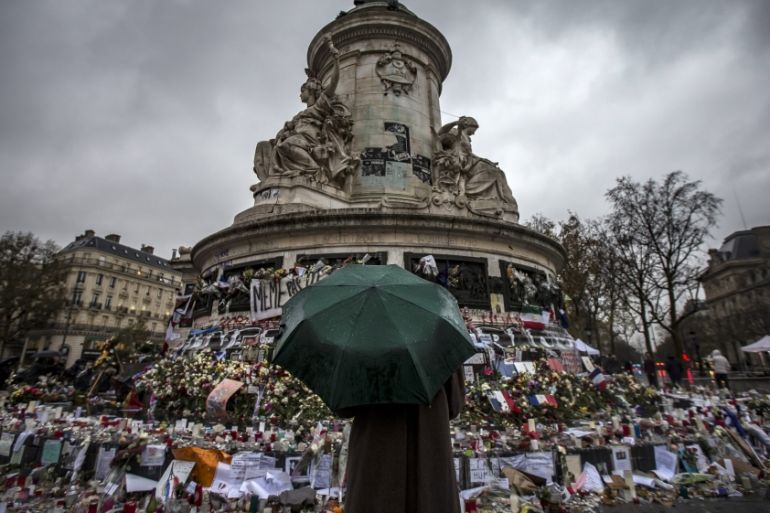Paris attacks: Fear, mourning and indifference
The attacks that killed 130 remain the focus of many conversations in Paris but some outside the city feel no change.

At Place de la Republique, Frederic and Emma are catching up at a bar.
Like many others in France, the old friends are sharing their analysis of the Paris attacks that left 130 people dead.
Keep reading
list of 4 itemsParis attacks suspect apologises to victims, seeks forgiveness
Main Paris attacks suspect Abdeslam says he ‘didn’t kill anyone’
Security high in Paris as biggest trial begins over 2015 attacks
They are loud, vibrant, passionate, and they pepper their conversation with smutty jokes, free from prying ears, as they are the only ones on the terrace at 5pm on a Tuesday.
“We’re fighting against morons,” Frederic says as he gestures for another coffee.
At a nearby restaurant, three heavily armed police officers stand guard, ready to snuff out a repeat of the attack.
As a police car zooms past with all its lights on, those inside the restaurant fall silent and edgy heads turn to find out what is happening.
|
|
The restaurant owner, Nicolas, a man in his 40s, is looking at his accounts and confirms a “40 percent drop in my customers figures”.
After the attacks, most of his clients are foreign journalists who are reporting live from Place de la Republique, he says.
Despite the drop in numbers, Paris – one of the world’s most visited cities – continues to draw tourists.
Laura and Quentin, students from the southern city of Toulouse, are in the capital for a week.
They were told life was getting back to normal but they are still careful.
“We’re avoiding big public spaces and we try not to go out too much at night,” says Quentin, describing the shock he felt when he heard Manuel Valls, the French prime minister, mentioning the possibility of a chemical attack.
The atmosphere in Tolouse, they say, was also tense. The city was the scene of a deadly attack on a Jewish school in 2012.
State of emergency
Amid fears of another round of attacks, some Parisians are concerned about the possible effect the government policy will have on civil liberties.
The French government has imposed a state of emergency for three months following the attack, which strengthens police powers.
Zehra, who lives in the Paris suburbs, is concerned that some police officers are not using their powers responsibly.
|
|
“Security is paramount but I have seen some abuses by the police, and I don’t agree with that at all,” she says.
For Zehra, the threat of further ISIL attacks is ever present and she says she “expects anything now”.
The feeling of tension, though, is far from universal.
Frederic, who spends his time between Paris and the countryside, says that the lives of many of those outside the city are untouched by the attacks.
“In the countryside, people feel distant from the events,” he says, describing how a friend from his hometown confided to him that the events had not moved him at all.
“Where I live, in this lost village, the next day, people were out hunting.”
Frederic also talks about the hate he has witnessed or heard about.
In a village near where he lives, just days after the attacks some people decided to throw ham at a mosque.
Back in Paris, near the Casa Nostra restaurant, where five people died in the attacks, raindrops cover the flowers laid out at the entrance.
Groups of tourists and Parisians pass by.
One person stops to take photos.
![France has put into place a state of emergency for at least three months [Pascal Rossignol/Reuters]](/wp-content/uploads/2015/11/b410370788734381b46787c1245ec548_18.jpeg)